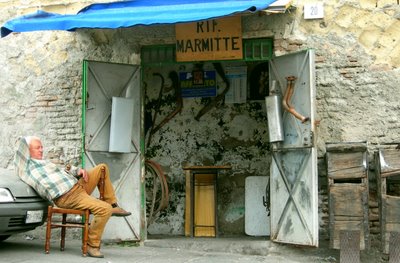Apr 29, 2006
Apr 28, 2006
Apr 12, 2006
Prodi’s Priority Inversion

That foreign policy alone will not win you elections is probably an empirically valid observation from both Western Europe and
Piazza Maggiore,
Inspired by tonight’s speech one willingly exclaims: Europa Riparte!
But let's not get deveived by words. Pure rhetoric will not automatically translate into a come-back of courageous, far-sighted, Pan European leadership. The crude reality is that visionary European politics requires strong national foundations. Given yesterday’s results, Italian foundations seem particularly fragile. Therefore, tonight’s priority inversion will probably straighten out much sooner than Prodi would want.
Apr 11, 2006
The Day After

What do we make of the decimal difference between l’Unione and Casa della Liberta in today’s elections?
Maybe, politics is just like a 100m sprint where 1/100's of a second decide about victory…
Or rather the parity is due to the nearly similar programme presented by the coalitions, which turned the elections into something similar to a coin flipping exercise with a 50/50 chance of heads or tails, red or blue, Prodi or Berlusconi. Given the large sample of voters (turnout of more than 80% ), the laws of probability were unsurprisingly proved right.
We could go on and explain the surrealist outcome with other banal parallels, but the German election outcome from last autumn hints an answer. Like in
In light of what the future is likely to hold, the return of DC-like, centre politics, still remains a distant, but no longer surrealist alternative.
Apr 8, 2006
finito

So we’ve come to the end… Personally, I must admit to have greatly profited from the campaign— not only did I learn to swear in Italian thanks to Silvio (coglioni votano per la sinistra), but I was reminded about the cannibal practices of Chinese communists and was instructed that EU and UN observers should follow elections not only in Belarus and the Ukraine but also here in Italy.
Similarly instructive lessons stemmed from the Polish election campaign last fall. The main thrust of the campaign was the sad fait of the citizens of
Unfortunately, in both campaigns I did not learn much about how the respective political parties planned to rule the country. Just think what were/are the campaigns' facts the voters have based their decisions on.
Pretty frightening…




